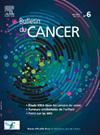Traitement standard des cancers bronchiques non à petites cellules métastatiques mutés EGFR en première ligne et à progression
IF 1.1
4区 医学
Q4 ONCOLOGY
引用次数: 0
Abstract
Parmi les altérations oncogéniques du cancer bronchique non à petites cellules (CBNPC), la mutation du gène EGFR est observée chez 15 % des patients en France, particulièrement chez les non-fumeurs et les femmes. Le traitement repose principalement sur les inhibiteurs de tyrosine kinase (ITK) ciblant EGFR. En première ligne métastatique, l'osimertinib, ITK de troisième génération, s'impose comme le standard, améliorant la survie sans progression et la survie globale par rapport aux ITK de première ou deuxième génération. L'association ITK/chimiothérapie (osimertinib/carboplatine-pemetrexed) et ITK/anticorps bispécifiques (ex. amivantamab/lazertinib) sont des alternatives en cours d’évaluation, avec des bénéfices en survie sans progression mais une toxicité accrue. En cas de progression sous ITK de première ou deuxième génération, la résistance la plus fréquente est la mutation T790M, ciblable par l'osimertinib. Pour les autres résistances, la chimiothérapie à base de platine reste une option. L'amivantamab associé à la chimiothérapie a montré une amélioration de la survie sans progression en deuxième ligne et dispose d'un accès précoce en France. D'autres approches émergent, incluant les anticorps conjugués (patritumab deruxtecan, datopotamab deruxtecan) et les ITK de nouvelle génération. À l'avenir, la personnalisation du traitement en fonction du profil moléculaire et de la réponse précoce aux ITK pourrait optimiser la prise en charge, notamment en intégrant des marqueurs prédictifs comme la clairance de l'EGFR sous traitement.
Among the oncogenic alterations of non-small cell lung cancer (NSCLC), the EGFR gene mutation is observed in 15% of patients in France, particularly among non-smokers and women. Treatment mainly relies on tyrosine kinase inhibitors (TKIs) targeting EGFR. In first-line metastatic treatment, osimertinib, a third-generation TKI, has become the standard, improving progression-free survival (PFS) and overall survival (OS) compared to first- or second-generation TKIs. The combination of TKI/chemotherapy (osimertinib/carboplatine-pemetrexed) and TKI/bispecific antibodies (e.g., amivantamab/lazertinib) are alternatives under evaluation, with benefits in PFS but increased toxicity. In case of progression under first- or second-generation TKIs, the most common resistance is the T790M mutation, which can be targeted by osimertinib. For other resistances, platinum-based chemotherapy remains an option. Amivantamab combined with chemotherapy has shown an improvement in PFS in the second line and has early access in France. Other emerging approaches include conjugated antibodies (patritumab deruxtecan, datopotamab deruxtecan) and next-generation TKIs. In the future, personalized treatment based on the molecular profile and early response to TKIs could optimize management, particularly by integrating predictive markers such as EGFR clearance under treatment.
求助全文
约1分钟内获得全文
求助全文
来源期刊

Bulletin Du Cancer
医学-肿瘤学
CiteScore
1.90
自引率
16.70%
发文量
224
审稿时长
37 days
期刊介绍:
Without doubt, the ''Bulletin du Cancer'' is the French language publication of reference in the field of cancerology. Official organ of the French Society of Cancer, this journal covers all the information available, whether in the form of original articles or review articles, but also clinical cases and letters to the editor, including various disciplines as onco-hematology, solids tumors, medical oncology, pharmacology, epidemiology, biology as well as fundamental research in cancerology. The journal proposes a clinical and therapeutic approach of high scientific standard and regular updates in knowledge are thus made possible. Articles can be submitted in French or English.
 求助内容:
求助内容: 应助结果提醒方式:
应助结果提醒方式:


